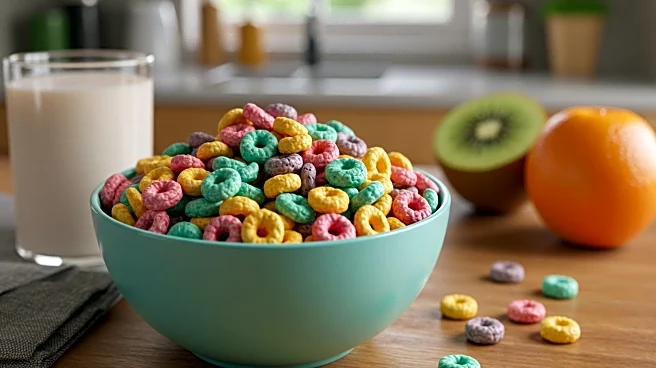What is the story about?
What's Happening?
Texas Attorney General Ken Paxton announced that WK Kellogg Co., known as Kellogg's, has signed a legally binding agreement to remove toxic dyes from its cereals by the end of 2027. This Assurance of Voluntary Compliance (AVC) marks Kellogg's as the first company to officially commit to eliminating artificial food colorings from its products. The agreement follows months of investigation and negotiation, initiated by Paxton's office, which issued a Civil Investigative Demand to Kellogg's in February and formally announced an investigation in April. The move comes after allegations that Kellogg's removed toxic ingredients from products in Canada and Europe but continued using them in the U.S. Paxton has urged other food manufacturers to follow Kellogg's lead in promoting healthier food options.
Why It's Important?
The removal of toxic dyes from Kellogg's cereals is significant for U.S. consumers, particularly children, who are the primary consumers of these products. Artificial food colorings have been linked to health issues such as hyperactivity, obesity, autoimmune disorders, endocrine problems, and cancer. By committing to eliminate these dyes, Kellogg's is addressing public health concerns and potentially setting a precedent for other food manufacturers. This decision could lead to broader industry changes, encouraging companies to prioritize consumer health and transparency in product labeling. The agreement also highlights the role of legal and regulatory actions in influencing corporate practices and protecting consumer interests.
What's Next?
Kellogg's plans to complete the removal of artificial food colorings by the end of 2027. As the company implements this change, other food manufacturers may face increased pressure to adopt similar measures. The Texas Attorney General's office may continue to monitor Kellogg's compliance and potentially investigate other companies that use artificial dyes. Consumer advocacy groups and health organizations are likely to support these efforts, pushing for more stringent regulations on food additives. The broader food industry may see shifts in marketing strategies, with companies emphasizing natural ingredients and health benefits to meet consumer demand for healthier products.
Beyond the Headlines
The agreement between Kellogg's and the Texas Attorney General's office could have long-term implications for food labeling and marketing practices. It raises ethical questions about the responsibility of food manufacturers to provide accurate information about product health impacts. The move may also influence cultural perceptions of food safety and quality, encouraging consumers to be more critical of ingredient lists and health claims. Additionally, this development could spur innovation in food manufacturing, as companies seek alternative natural colorings and ingredients to replace artificial dyes.


















